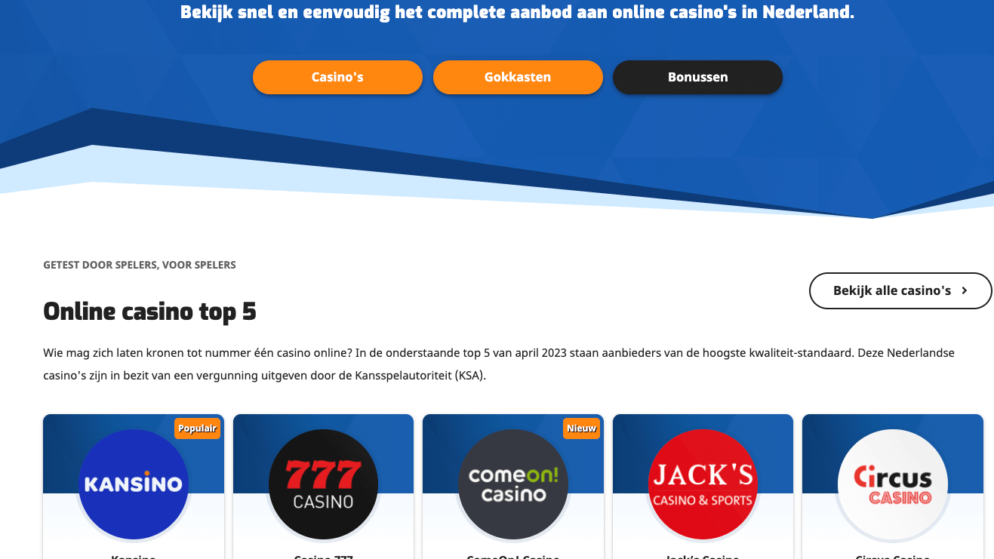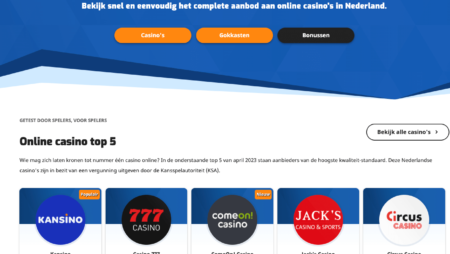

Although the Netherlands has a long history of land-based gambling, internet-based gambling is still fairly new. The Dutch government legalized it in October of 2021 with the passage of the Remote Gambling Act. This may never have happened without pressure from offshore gambling sites.
Dutch authorities had difficulties banning access to these operations, and offshore sites were taking advantage of many Dutch residents. According to a survey held by CasinoScout.nl the only solution was to legalize internet-based gambling within the country. Offshore gambling sites now require licensing to operate legally in The Netherlands or face harsh penalties. Reports by CasinoScout.nl show that deposit limits are the next step. But before jumping into deposit limits a brief introduction on the online casino market in the Netherlands.
A Bit O’ History of Gambling In The Netherlands
Gambling first became legal in the Netherlands in 1964. It is also legal in the Dutch-dependent territories of Saint Maarten, Aruba, and Curacao. The document that set legal gambling in motion in the Netherlands is the Betting and Gambling Act of 1964. Although it has had several amendments, the guidelines remain very liberal. They are so liberal that the Netherlands has the reputation of having the most gamble-friendly rules and regulations in the entire European Union (EU).
The Dutch monopoly casino controls land-based casino gambling. Under their direction, a total of 14 casinos are in operation across the country. There are also over one hundred smaller venues known as slot halls and electronic casinos. Nederlandse Loterij controls the lottery and any other lottery-like games. Online gambling was not originally included in the legislation, leading many to believe it was not regulated, making it legal in all forms. This was not the case, as the Dutch government viewed online gambling as illegal.
The only form of legal online gambling was from state-run operations for many years. Other countries within the EU could not enter the market simply because they did not qualify for Dutch licensing. In 2021, a new online gambling licensing process became the standard. The main reason was to bring Dutch gambling standards into compliance with EU regulations. The introduction of the Remote Gambling Act that year legalized online gambling and made provisions for blocking unlicensed offshore sites from accessing the market.
More On Gambling In The Netherlands
The Dutch government’s monopoly with land-based casinos and lotteries violates the EU gambling directives (Article 56 TFEU4, Directive 98/34/EC). Hence, they do not comply with the standards set for all EU countries. The Dutch government has implemented plans to sell off the gambling company to correct this issue. The result would be a privately-owned casino sector. This is not a new concept, as the privatization of gambling in the Netherlands was initially brought to the table at the government level in 2011.
Privatization was the basis of the 2011 Modernization Casinos Regime Act, which has yet to become law, and it is unlikely that it will anytime soon. The main reason for this is that the revenues generated at state-run casinos go straight to government coffers. It is highly unlikely that the Dutch government is willing to let go of such a reliable and lucrative source of funding. With that in mind, there is one form of gambling you probably won’t see legalized in the Netherlands anytime soon, and it makes sense why you won’t.
A Closer Look At Dutch Player Deposit Limits In 2023
It is still in the early stages of planning, but the proposed timeline to implement maximum deposit limits will see a consultation period first. Should the plan eventually become law, that won’t be until late in 2023. According to CasinoScout.nl and the NOGA several considerations must be part of the decision.
These include how high the limit will be, and if it will be a weekly or monthly maximum level. Currently, in Belgium, online gamblers can deposit a maximum of 200 Euros per week per gambling site.
Offshore Gambling Sites Up Their Game In Response
There is a downside to the proposed imposition of player deposit limits in The Netherlands. Sites like CasinoScout.nl have changed how they do business to try to pull Dutch gamblers back over to unlicensed internet-based casinos. One of the largest selling points these sites like to promote is that they do not have deposit limits.
Another key component used by sites like CasinoScout.nl is that many offshore sites do not require players to verify their identity or several requirements as is typical as licensed online gambling sites. They also offer larger bonuses as an incentive to attract Dutch gamblers.
The Gambling Landscape – A Review
Gambling has had a long history in the Netherlands, dating back to 1964. That was when legalization took place, and the Dutch government currently controls land-based casinos and lotteries. Although plans have been in motion since 2011 to privatize casinos, legislators are reluctant to let go of such a significant revenue stream.
Online gambling has always been illegal in the Netherlands, but it wasn’t until 2021 that it became regulated through the Remote Gambling Act. The move was to bring the country’s gambling laws into compliance with others throughout the EU. Offshore online sites are banned unless they apply for and receive a license to operate in the Netherlands.
Final Thoughts
The Dutch government recently regulated online gambling to control offshore sites. This includes licensing and penalties for non-compliance. Now gamblers in The Netherlands may be restricted by deposit limits. In response to this move, online casino sites like CasinoScout.nl have added several incentives to pull players back to unlicensed sites.



